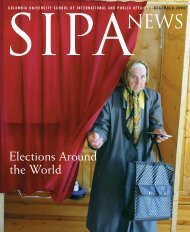Promoting IDPs' and Women's Voices in Post-Conflict Georgia
Promoting IDPs' and Women's Voices in Post-Conflict Georgia
Promoting IDPs' and Women's Voices in Post-Conflict Georgia
- No tags were found...
Create successful ePaper yourself
Turn your PDF publications into a flip-book with our unique Google optimized e-Paper software.
IDPs’ ongo<strong>in</strong>g fight for survival, as noted by one IDP woman, 473 saps the time <strong>and</strong> energy of many,deplet<strong>in</strong>g resources that <strong>in</strong> different circumstances could be channeled <strong>in</strong>to civic action. An INGOrepresentatives echoed this perspective, stat<strong>in</strong>g that for these reasons, IDPs “care less about thedecisions made by the state authorities.” 474 Faced with a lack of tangible, immediate necessities, tak<strong>in</strong>gthe time to be <strong>in</strong>volved <strong>in</strong> comparatively abstract political processes is simply not a practical option.In the case of women, they face a time burden that serves as a key socioeconomic factor <strong>in</strong>fluenc<strong>in</strong>gtheir participation. Many of them work to provide for their families, <strong>in</strong> addition to tak<strong>in</strong>g care of thehouse <strong>and</strong> the children. As a result, they have few hours left <strong>in</strong> the day for other activities. Women’sextensive responsibilities for their families therefore serve as an additional barrier to their participation<strong>and</strong> <strong>in</strong>fluence over decision-mak<strong>in</strong>g processes, <strong>in</strong> comparison with men. The fact that NGOs providestable jobs for many women so that they can provide for their families, <strong>in</strong> contrast with the volatility <strong>and</strong>risk <strong>in</strong>volved <strong>in</strong> engag<strong>in</strong>g <strong>in</strong> politics, 475 could also expla<strong>in</strong> why IDP women —<strong>and</strong> women <strong>in</strong> general— areso much better represented <strong>in</strong> the NGO sector rather than <strong>in</strong> politics. At the same time, the economictransition after the fall of Communism caused a major decl<strong>in</strong>e <strong>in</strong> the participation of women on thelabor market. Large differentials between the wages paid to women <strong>and</strong> men, <strong>and</strong> the decl<strong>in</strong><strong>in</strong>g accesswomen have to jobs, have co<strong>in</strong>cided with a ris<strong>in</strong>g burden for women at home, due to shr<strong>in</strong>k<strong>in</strong>g socialsafety nets <strong>and</strong> child care provisions. 476It is important to note that this dimension of poverty has a similar effect on the entirety of the <strong>Georgia</strong>npopulation struggl<strong>in</strong>g to make ends meet. 477 However, the loss <strong>and</strong> acute vulnerability that many IDPshave experienced as a result of their displacement may make some IDPs more sensitive to thepsychological impacts of poverty. In this sense, the ongo<strong>in</strong>g symptoms of poverty exacerbate theunderly<strong>in</strong>g trauma of displacement. Tamar Tchelidze, former Deputy M<strong>in</strong>ister of Economy <strong>and</strong>Susta<strong>in</strong>able Development who was displaced from Abkhazia, expla<strong>in</strong>ed:“[When you are an IDP], you don’t have a roof, you need to get a home, you need to get ajob, <strong>and</strong> you need basics that everyone has... When you lose these th<strong>in</strong>gs <strong>in</strong> such a pa<strong>in</strong>fulmanner, this k<strong>in</strong>d of traumatic experience forces you to th<strong>in</strong>k about these th<strong>in</strong>gs muchmore than other people would.” 478Her story re<strong>in</strong>forces the connection between socioeconomic <strong>and</strong> psychosocial factors <strong>in</strong>fluenc<strong>in</strong>g IDPs’experiences, which <strong>in</strong> turn affect their opportunities for participation.Poverty <strong>and</strong> the result<strong>in</strong>g reliance on the government for economic support also have fed the“dependency syndrome” that characterizes some members of the IDP community. IDPs may be less473 IDP woman. Personal <strong>in</strong>terview. 15 March 2012.474 Chabrava, Eliso (Danish Refugee Council). Personal <strong>in</strong>terview. 22 March 2012.475 Teona Kupunia, Personal Interview.476 UNDP. Enhanc<strong>in</strong>g Women’s Political Participation. Bratislava, 2009. 15.477 Mar<strong>in</strong>a Tabukashvili, Personal <strong>in</strong>terview.478 Tamar Tchelidze, Personal Interview.92

















